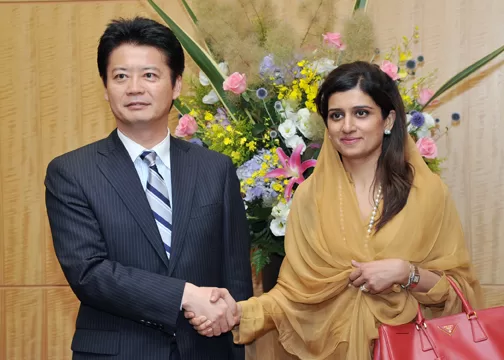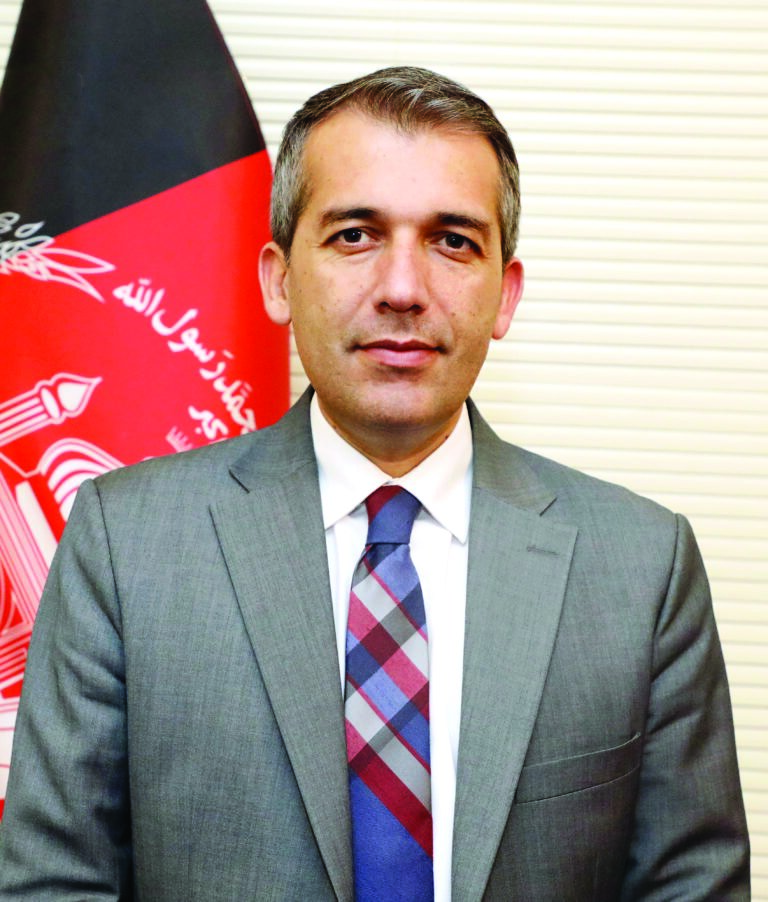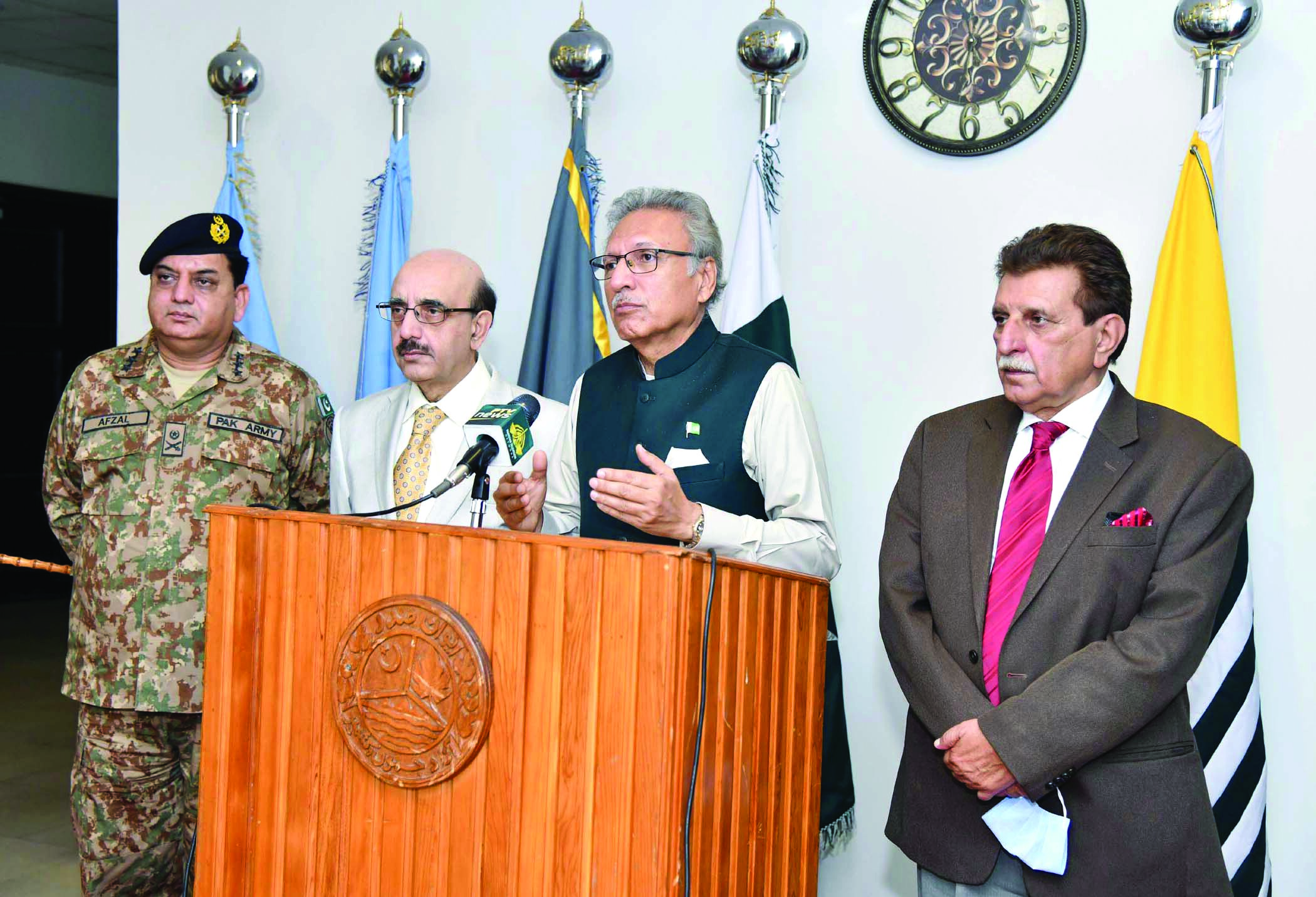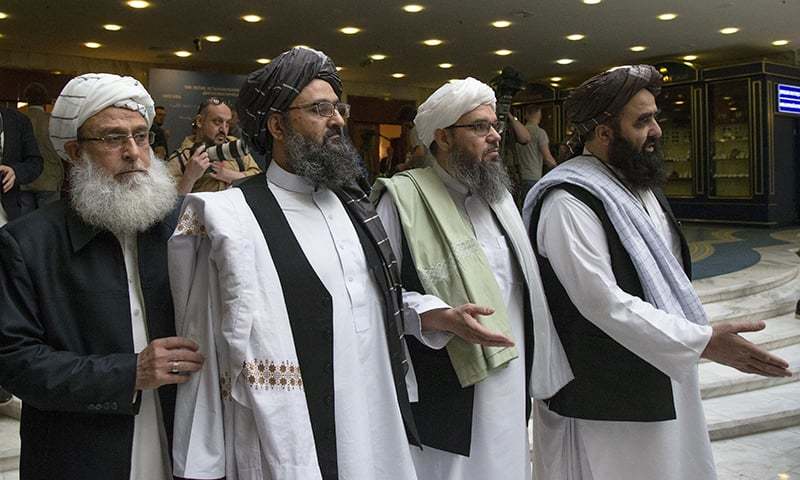Pakistan and Japan are celebrating 60th years of diplomatic ties during 2012. The governments and leaderships of both the countries are strongly stressing the need to have closer cooperation in the different fields of trade and commerce, education, investments, joint ventures and the last but not the least culture for the further strengthening of bilateral relations.
Right from the beginning Japan established a liaison office in Karachi in December 1950. Afterwards, the San Francisco Peace Treaty established diplomatic relations between the two sides in 1952. Trade and commerce including economic relations has been steadily developed. Bilateral economic relationship including trade between Japan and Pakistan has been steadily promoted. Commerce treaty in 1960 played crucial role in this regard. Japan has been one of the major trade partners of Pakistan. In the development cooperation field, Japan has already contributed to the economic development of Pakistan as a major bilateral development cooperation partner.
On its part, Pakistan supported Japan in the field of cotton spinning and textile industries because during World War II its industry was ruined. Pakistan exported raw cotton and imported cotton textiles from Japan under the open General License System which benefited Japanese economy and industry to flourish. Japan experienced acute foodstuff shortage and again Pakistan had supplied rice to Japan during 1950s.
| Pakistan | Japan |
| Pakistan is blessed with numerous natural resources, fertile land and strong human resource base | Japan is an industrialized country. One of the mot knowledge based economy, strong service sector and diversification of energy resources. |
| Working Combination | Joint venture, transfer of technology. and cooperation in energy sector would bring greater dividends in shape production, consumption, optimal utilization of natural resources, value addition, exports and the last but not the least, greater inflows of investments in the days to come. |
Japan exported spinning machinery to Pakistan, and currently textile yarn and fabrics the largest component of Pakistani exports to Japan. Pakistan considers Japan is one of the most important trading partner and strategic ally in some fields. During 1990-91 to 1999-2000 Pakistan’s major export went to seven countries namely, USA, Germany, Japan, U.K., Hong Kong, Dubai and Saudi Arabia.
Pakistan’s total export to Japan stands at $240 million, while the imports are $1.0 billion in 2010-11. Pakistan exports to Japan also declined by 62.65 percent in the year 1999-2000 in comparison of 1990-91. Pakistan exports to Japan had a rising trend up to the year 1993-94 but started declining mainly due to the antidumping duties of Japanese government on textile imports from Pakistan in 1995 and partially because of the rising trade between Japan and ASEAN countries.
The probable reasons for Japan decreasing trend in imports may be the joint venture between Pakistan and Japan in the automobile sector and the discouragement of Pakistani government for these imports to develop the home industry and con- serve the foreign exchange reserves.
Japan is the second largest trade partner for Pakistan following the United States. The export from Pakistan to Japan has increased from Rs.11.448 billion to Rs.13.850 billion in the year 1990-91 to 1999- 2000. Import from Japan to Pakistan also increased by Rs.22.161 billion to Rs.33.681 billion in the above same period. Deficit in the balance of trade has also increased from Rs.10.713 billion to Rs.19.813 billion during the period from 1990-91 to 1999-2000. Pakistan has average exported Suggestions Pakistan to Japan Rs.15.228 billion and imported from Japan average Rs.34.679 billion and balance of payment in deficit was averagely Rs.19.450 billion during the period from 1990-91 to 1999-2000.
Pakistan has average exported to japan Rs.15.228 billion and imported from japan average Rs. 34.679 billion and balance of payment in deficit was averagely Rs.19.450 billion during the Period from 1990-91 to 1999-2000.

Currently around 40 Japanese companies are operating Pakistan. Among them, leading Japanese companies are Suzuki, Toyota, Honda and Hino etc. Pakistan’s main export items to Japan are textile yarn, woven fabrics, leather and leather manufactures, sport goods, fish and fish products. The main imports items from Japan include road vehicles, boilers, machinery and equipment, iron and steel, telecommunication and organic chemicals.
Pakistani exporters, in cooperation of Japan International Cooperation Agency (JICA) and JETRO, are also trying to get greater market shares in the Japanese textile market, while exporters of mangoes/fruits were also waiting for the resolution of quarantine issue to enter the foreign market.
| Suggestions Pakistan | ||
| Suggestion No. I | Japanese government imposed certain conditions on the trade with Pakistan after the nuclear explosion, which had negative impact on Pak-Japan trade relation. These impositions should be removed to encourage the trade relations between both countries. | |
| Suggestion No. II | Both countries should resolve the duties against import of textile machinery and other industrial equipment. | |
| Suggestion No. III | The exports, businessmen and the govemment of Pakistan should realize the importance of value-added products to Japan rather raw material. | |
| Suggestion No. IV | More diversification in Pakistan exports. Agricultural exports must be increased. | |
| Suggestion No. V | More focus should no quality rather than quantity. Quality of goods with attractive packaging may Pakistani exports to Japan. | |
| Suggestion No. VI | Joint ventures in the fields of renewable energy mix would be useful for both the countries. | |
| Suggestion No. VII | Joint ventures in the fields of exploration of natural and marine resources, food packing and processing, education, media and cultural would create better understanding between both the countries. | |
| Suggestion VII | Pakistan should seek Japanese investment in the Special Economic Zones (SEZ). | |
| Suggestion No. VIII | The government of Pakistan should invite Japanese companies to invest in Zulfiqarabad City Project. | |
| Suggestion No. VIV | Revival of Pakistan-Japan Joint Public and Private Dialogues to finalize a roadmap for expansion in the trade and economic cooperation between the two countries. | |
| Suggestion No. VV | Japan-Pakistan free-trade agreement (FTA). | |
It is evidence from the above table that the annual workers remittance decline year after year. Because annual workers remittance (AWR) was US$ 26.84 million in the year 1990-91 but it declined and reached to only US$ 1.58 million in the year 1999-2000.
During the last six decades, both the countries exchanged a number of meaningful spells and delegations at the highest level. The visit of President Asif Ali Zardari to Japan in February, 2011 was a great success.
Right from the beginning Pakistan has been included as a special country in Japanese foreign policy priority. Japan recognizes Pakistan’s role in the ongoing war against terrorism. Pakistan has to face great challenges in its commitment against terror and Japan intends to support the people of Pakistan to meet this challenge.
Pakistan is strategically located country and supposed to be gate- way to many regions not confined to South Asia, Middle East, and Central Asia. The Government of Japan supports Pakistan to further contribute to intra and inter-regional stability and prosperity.
Japan has been supporting the government of Pakistan and its people to achieve sustainable development and democracy and flourish as a moderate and modernized Islamic country. The last but not the least, Japan will continue to work with Pakistan in order to strengthen cooperative economic relations with Pakistan, which will be beneficial to both countries.
Japan is one of the leading and active member countries of the Friends of Democratic Pakistan (FODP) group and has already pledged funds. A Ministerial Meeting of the FODP and Pakistan Donors Conference were held in Tokyo in April 2009.
Japan was among the first countries to respond different natural floods (2010-11) and earth quakes (2004). It extended emergency humanitarian assistance.
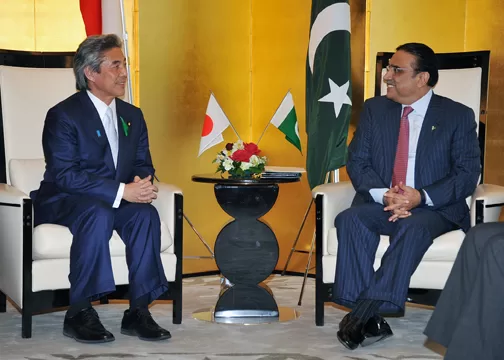
President Asif Ali Zardari visited Japan on February 21-23, 2011 and exchanged views on different regional and international issues. He also signed the Joint Statement on Japan-Pakistan Comprehensive Partnership. Japanese Prime Minister Naoto Kan and President Zardari signed the Joint Statement on Japan-Pakistan Comprehensive Partnership.
| Japan`s Assistance | Emergency grant, emergency relief goods, as well as air lift activities by Japan Self-Defence Forces helicopters (August 30-October 10) and medical support activities (September 5-22) in southern Punjab. |
Salient Features
- • Both leaders witnessed the signing ceremony for the ODA loan agreement for the Khyber Pakhtunthwa Emergency Rural Road Rehabilitation Program (flood relief).
- • Both agreed to have a task force to strengthen bilateral economic relations based on mutual interests.
- • In order to further strengthening of bilateral relations and attracting greater Japanese public-private sector inflows of investments, Pakistan enhance security measures for would Japanese nationals, streamline administrative procedures, and develop basic infrastructure to promote entry of Japanese companies.
- • Japan would provide financial assistance include co-financing with Poverty Reduction Support Credits (PRSC) and cooperation in the areas of infrastructure such as transport, as well as water resource management, energy, education, human resource development, dis- aster risk reduction and health.
- • Sign of satisfaction at high calamities in shape of disastrous level dialogues, including Foreign Ministers’ meetings, political consultations, high level economic dialogue, security dialogue and government-business dialogue and decided to continue to hold regular in depth exchanges on matters of mutual interest.
- • Further enhancing of mutually beneficial economic and trade interaction by promoting and inter alia devising appropriate ways and means to facilitate private sector cooperation; joint ventures; financial and banking sector cooperation; agriculture and food cooperation; mineral resources development, energy sector cooperation and establishment of Japan-specific industrial zones in Pakistan.
- • Stability and development of Afghanistan is vital for regional stability and stated that both Governments will continue their support to Afghanistan.
•Closer bilateral cooperation between the two countries in the scientific and technological fields including through the promotion of student exchanges. - • Great scope for the expansion of bilateral defense and security cooperation. They decided to strengthen cooperation in the field of defense including through training of defense personnel and cooperation between their respective defense educational institutions.
- • Recognition of maintaining the safety and security of maritime navigation and to further enhance cooperation in this regard.
- • Common sharing the global objectives of disarmament and non- proliferation.
- • Developing closer consultations and meetings on the issue of global climate change.
- • Promotion of public-private sectors dialogue for enhancing trade and commerce activities.
- • Strengthening people to people contacts particularly focusing on parliamentary, business and youth exchanges, inter alia through Japan-East Asia Network of Exchange for Students and Youths (JENESYS).
- • Underlining the need for a reform of the UN Security Council (UNSC).
- • Pakistan supported Japan’s position on North Korea, which attaches overarching importance to bringing about a comprehensive solution to all issues relating to North Korea of concern to Japan, Such as the issues of nuclear programs, missile development and abduction in particular.
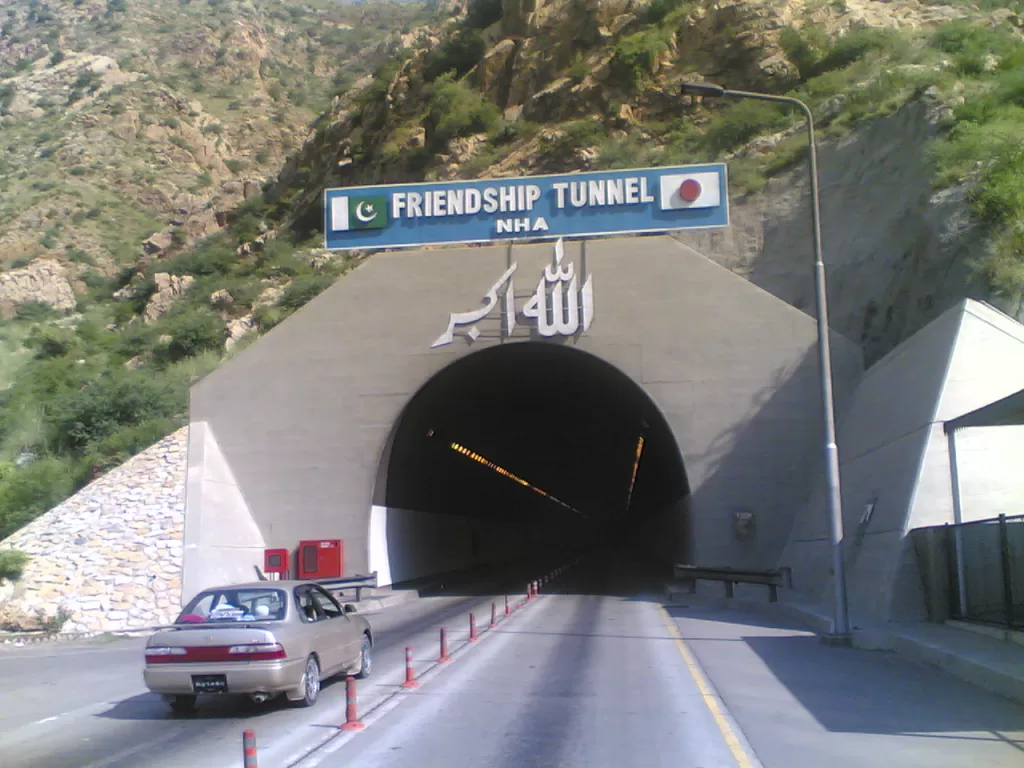
| Recent Socio-Economic Grant/Project | ||
| Japan | Details | |
| Financial Grant | US$ 203,671 (approx. Rs. 17.0 million) to the Aga Khan Cultural Service Pakistan (AKCSP) for the Environmental Sanitation and Water Supply Projects in Hunza, Gilgit- Baltistan. Community-based Environmental Sanitation, in Altit, Hunza. Around 237 households (1,820 individuals) including IDPs. | |
| Financial Grant | US$ 86,029 (approx. Rs. 7.2 million) to the Social Welfare Council Kuri Dolal (SWCKD) for the Construction of Concrete Link Road in Gujar Khan, District Rawalpindi, Punjab. | |
| Financial Grant | Japan completed “Al-Khair School” at New Karachi, Sindh, worth US$ 70,821 (approx. Rs.6 million) in collaboration with Idara Al-Khair Welfare Society under the scheme of the Grant Assistance for Grassroots Human Security Projects (GGP), on March 2, 2011. | |
| Soft Loan | The Government of Japan, today, extended a soft loan of 23.3 billion Yen (approximately 260 million US dollars) to the Government of Pakistan for the National Transmission Lines and Grid Stations Strengthening Project. | |
| Financial Support | US $ 5.4 million (480 million yen) to the Government of Pakistan for Clean Energy Project by using the latest technology of solar energy panels. | |
| Different ongoing Projects | Indus Highway Project, a number of power projects, rural roads construction projects and the Children Hospital of PIMS. | |
Concluding Remarks
The “Rising Sun Land”, Japan and “Center of Gandhra Civilization”, Pakistan would play very important role in many regional and international issues not confined to socio-economic integration, foreign direct investments, science and technology transfer and cooperation in renewable energy mix. Both countries would cooperate in bringing peace in Afghanistan.
It is hoped that ongoing rigorous celebrations of 60th years of diplomatic ties between the two countries would open many avenues of mutual cooperation and collaboration in the days to come.


